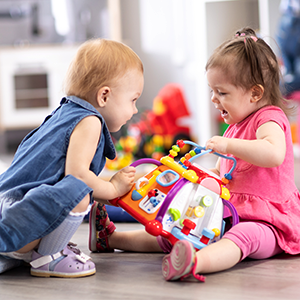When toddlers have play dates, territorial battles are bound to ensue. To
foster sharing skills in young children, consider these 12 tips:
- Start early.
Children can’t cognitively grasp the concept of sharing until they reach
the developmental age of 3 or 4, but parents should set the expectation and
foster learning opportunities early on. - Show and tell.
Children often imitate what they see others doing. When you have
opportunities to share food, a toy or another activity with your child,
talk about how you are sharing so he begins to associate the word with the
action. - Pretend play.
Imaginative play can provide powerful lessons in sharing. Place a puppet in
each hand and have them discuss and act out sharing scenes. Then invite
your child to join in. Tea parties and play kitchens are good platforms
too. - Read books.
Read children’s stories about sharing, then talk about past experiences:
“Do you remember when you shared your toy with Eli yesterday? That’s what
the children are doing in the book.” - Talk it up.
Before play dates, remind your child how much fun it is to play with his
friends and tell him he will need to share his toys. - Stash special items.
Have a designated basket to place special toys that don’t come out during
play dates. For some children, it will be helpful to be part of the
process; other kids won’t understand. - Have duplicates on hand.
Having more than one of a given toy will allow children to play alongside
of, and imitate, one another. It may also avoid an altercation. - Build in cooperative activities.
Group activities such as drawing, finger painting, Play-Doh or blowing
bubbles can be used to teach sharing skills. As the children participate in
these activities, talk about sharing and how well they are playing
together. - Include adult interaction.
From time to time it may be helpful if you participate in your child’s
group play so you can support him in being kind and sharing. It may even
stop a squabble. - Promote with praise.
When you see your child sharing, bring it to his attention. Kids want to
please their parents, so be sure to offer plenty of praise. - Set up sharing situations.
Create opportunities for your child to develop empathy and sharing skills.
Have him help you make a batch of cookies, then hand them out to his
friends. Or encourage him to draw a picture or make a card for a friend. - Address major misdemeanors.
If your child grabs a toy while playing with a friend, tell him he must
give it back and wait for his turn to play with it. Offer an alternative
toy as a distraction. If it turns into a tantrum, remove your child from
the situation and sit next to him until he calms down. If one child hurts
another over a toy, remove it from the play area.


